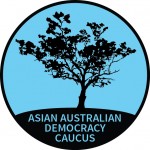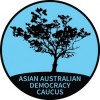 We would like to thank Eleanor Jackson for her gracious welcome to Peril. In 2015, the Asian Australian Democracy Caucus (AADC) will be publishing original articles and opinion here in partnership with this singular online magazine.
We would like to thank Eleanor Jackson for her gracious welcome to Peril. In 2015, the Asian Australian Democracy Caucus (AADC) will be publishing original articles and opinion here in partnership with this singular online magazine.
We see that this partnership represents a unique opportunity to explore and provide a platform for a burgeoning Asian Australian political consciousness, to facilitate opportunities for discussion among a broader Asian Australian community on political issues that interest us, and that impact on our lives. In line with Peril’s broader mission, the AADC is interested in modes of democratic practice that engage politics through creative and reflective expression; in this case, through written political reflections.
Like a host of other fledgling groups and organisations, the AADC has grown out of the seismic social and political forces that have shaped Australia in the past few years, in particular, the escalation of debates about exclusions based on racial, cultural and religious grounds. However, where most people might acknowledge that in Australia’s past, our political system was central to the implementation of racism (such as through the White Australia Policy), we believe that in the 21st century it has the critical role in sustaining human dignity through the articulation of political and civil rights.
Basically, we want to reinforce the place of civic discourse amidst a polity whose interest and faith in democratic practice is waning. We want new avenues for this kind of discourse to occur, in forums that have previously been less-than-inclusive.
In ‘Rethinking the Public Sphere’ (1990), Nancy Fraser described the counter-public as “a means to resist the exclusionary norms of the bourgeois public, elaborating alternative styles of political behavior and norms of public speech”. She looked to subaltern counter-publics as a means to produce “oppositional interpretations of identities, interests and needs”.
Likewise, we see the need for political dialogue that is neither based on the civic norms set by a racialised white majority, nor reliant on forums that are dependent upon government bureaucracies and the favour of political parties. We see the need for political dialogue that is an expansion of the kinds of social and human contact that bring diverse communities closer to one another.
A key part of such a process is about creating communities, and therefore creating new kinds of identity and communication. Michael Warner in ‘Publics and Counterpublics’ (2002), like Fraser, suggested that in addressing a distinctive community or circulation of strangers, we are seeking to ‘establish a mirror’ to how people might publicly converse or be sociable with one another.
In light of the many ways in which political communication currently is abrasive and combative, our approach represents a visible shift in how we look at public forms of political communication. Postcolonial theorist Gayatri Spivak uses a term that gets close to what is our potential ethical terrain – this phrase is ethical singularity.
In her preface to Mahasweta Devi’s Imaginary maps (1988), Spivak writes about ethical singularity as a “mode of ethical action that is neither expressed through political crisis, nor an engagement with the radical or profound alterity of the Other”. For Spivak, an encounter with full ethical engagement is an exchange tempered by ‘normality,’ defined by a certain kind of accountability of language evoked through intimate one-on-one relations.
Spivak’s ethical singularity, which includes notions of conferring trust, leads us to interactions based in the interdependence of political actors, where the “object of ethical action is not an object of benevolence”, and is thus anchored in deep contingencies, and pervasively at risk of misinterpretation. For us, this is a worldview in which we do not really have the power to turn our backs on each other.
Political communication and exchange in our community admits political discourse is often combative and fractured, sometimes unpleasant and hostile. We must be discerning: we can neither sanction a politics that allows us to exclude participants simply because their views do not reflect our own, nor can we defer to perspectives whose very aims are to monopolise debate. Australia has sadly been down that path before. In the 21st century we should be championing a civic responsibility that reaches towards and walks with others.
This is a time for beginnings. For the AADC, this collaboration with Peril builds upon our new profiles on Facebook and Twitter. We are immensely grateful to Peril for providing a space to locate an important part of our online identity.
We invite you to join us for a different kind of conversation –
- If you are interested in political issues from Asian Australian perspectives,
- If you are interested in political issues that impact distinctively upon Asian Australian communities,
- If you are interested in the civic connections and ties between Asian Australian communities,
- If you want to build the profile of Asian Australian writers interested in political commentary and analysis.
If you want more information or to write for us, get in touch with us, Jen Tsen Kwok or Shinen Wong at [email protected].

